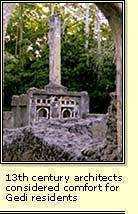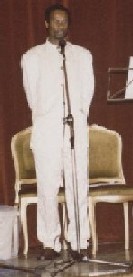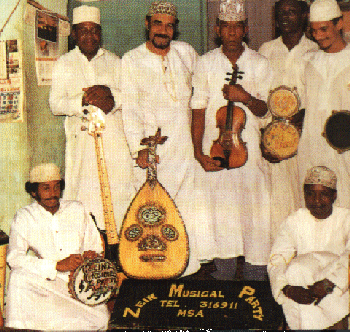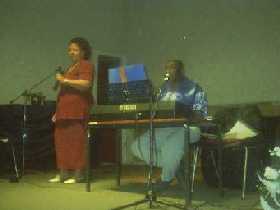
The Waswahili Community Trust UK
(Wadhamini wa Jumuiya ya Waswahili)


|
The Waswahili Community Trust UK |

|
Taarab Music |

Tarab, Taarab or Tarabu Music in Kiswahili is one of the most ancient forms of entertainment on the Eastern Coast of Africa from Kismayo at the Coast of Southern tip of Somalia to Sofarla in Mozambique, including the Comoro Islands in the Indian Ocean.
Tarab Music is a fusion of Swahili tunes sang in rhythmic poem spiced with Arabic or at times Indian melodies. Wherever the Swahili travelled, Tarab culture moved with them. No wonder it has penetrated to as far as Uganda, Rwanda and Burundi in the interior of East Africa.
In the Persian Gulf, Dubai, Abudhabi and Muscat play host to many groups of Tarab who perform in these capitals.
Traditionally, Tarab used to be performed at weddings and social gatherings like circumcision rites for infant boys or during the attainment of maid-hood for girls or during Eid celebrations.

Abdulwahid Sykes'book referred above shows that Taarab music and the message in the songs composed were used specifically to uplift the morale of TANU members, and also to circumvent the banning order of the party, TANU was used to organise taarab.
In recent times, politicians have taken advantage of Tarab's popularity among the masses to effectively use it as a tool for political campaigning.
The Swahili language which is a medium for Tarab politic, singing has two equally im portant roots, Arabic and Eastern Bantu languages. The Swahili have made a strongly individual culture out out of other people's.
Tarab, reflects the cosmopolitan qualities of a multi-racial people. It is differentfrom the main stream of Afdrican music, in that, at a later stage, its melody lines are long and the vocal syle is like like Arab or at tim es Indian singing.
An American Tarab researcher, John S Roberts in his commentry on original music, summed up this way:
In the nineteen Thirties and Forties, the intruments mainly used, were Arab Oud or Udi in Kiswahili which is a form of lute, the Darbuk, a pottery drum with a leather head, the Ganoon, a Middle Eastern Zither, the Fille, Tambourine and Rattle.
Nowadays, although the basic singing style is still the same, there is much more flexibility and variety than there ever was. New instruments have been introduced, such as violin, guitar, accordion and key board.
The most dynamic and famous Tarab siger of our time this century was the late Sitti Bint Saad of Zanzibar, who traversed the length and width of East frica in the Thirties and Fourties, entertaining dignitaries and ordinary folks alike.
She even visited Bombay, the capital city of India for recording sessions, as facilities were non-existent in East Africa. Her voice has come to symbolise the very essence of Swahili music.
Her voice has enriched people's lives which ennbled them with the truth and beauty. During her time, Sitti was compared to the lengendary Egyptian classical singer, the late Ummu Kulthoum or Lala Mangeshkar of India.
In the late fifties, another singer who went on to capture the hearts of coastal people, of East Africa and beyond was Ustadh Bakari Abeid of Zanzibar, and Ustadh Ali Mkali of Mombasa, Kenya.
Music Maestro, the late Ustadh Seif Salim Saleh, used to delight crowds wherever he performs and remains the best known Mucician today, who commands great respect among the people. He leads a highly cultured, and respectable orchestra ' Ikhwan Saffa ' established i 1905 in Zanzibar.

We appeal for your donation for our charity
Comments and suggestions to improve this website
Your suggestions or concerns about our services
Please send you contributions by filling a form.
| Thank you Asanteni |
|---|
Copyright© March 2003: The Waswahili Community Trust (UK)
Registered Charity:1083065